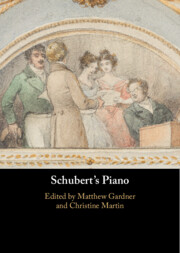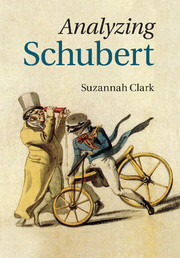Schubert's Piano
The piano features prominently in Schubert's musical output throughout his career, not only as an instrument for solo piano pieces (for two and four hands), but also in Lieder and chamber music as an equal partner to the voice or other instruments. His preference for the instrument is reflected in contemporary reports by his friends and colleagues as well as in iconography, where he is frequently depicted at the piano. In early nineteenth-century Vienna the piano underwent a rapid period of development, allowing composers to experiment with expanded ranges, sonorities and effects that differ substantially from modern concert grands. Schubert's Piano considers the composer's engagement with this instrument in terms of social history, performance and performance practices, aesthetics, sonority and musical imagery, and his approaches to composition across several musical genres, stimulating new insights into the creative interplay among Schubert's piano compositions.
- Contextualizes Schubert's use of the piano in composition and performance, and the instrument's position within early nineteenth-century Viennese society
- Bridges the gaps between organology, performance practice, social history, aesthetics, analysis and interpretation, and Schubert's sound world
- Covers multiple genres including piano music (sonatas, fantasies, variations, dances, marches, character pieces; for two and four hands), Lieder and chamber music
Reviews & endorsements
‘This volume not only addresses a surprising lacuna in Schubert studies. It does so with a breadth of coverage, imaginative élan, cohesion, and sense of completeness that are rarely encountered in edited volumes. With such a wealth of musical close readings, performance practice ideas, historical and literary context, and social and material culture, Schubert's Piano will appeal to a wide variety of readers.' John D. Wilson, University of Vienna, Department of Musicology
Product details
October 2024Adobe eBook Reader
9781009027380
0 pages
This ISBN is for an eBook version which is distributed on our behalf by a third party.
Table of Contents
- List of figures
- List of tables
- List of music examples
- Notes on contributors
- Acknowledgements
- Abbreviations and conventions
- Introduction Matthew Gardner and Christine Martin
- Part I. The Piano In Schubert's World:
- 1. Franz Schubert as a pianist Andrea Lindmayr-Brandl
- 2. Between society and solitude: Schubert's improvisations Lorraine Byrne Bodley
- 3. The piano in Schubert's lied texts Andreas Dorschel
- 4. Schubert's four-hand piano music Thomas Christensen
- Part II. Instruments and Performance:
- 5. Schubert and the Viennese piano Matthew Gardner
- 6. Performing simultaneous triplets and dotted rhythms in Schubert's piano music David Rowland
- 7. Viennese pianoforte treatises as reflection of Schubert's pianistic audience Mario Aschauer
- Part III. Sound and Musical Imagery:
- 8. Schubert as balladeer Laura Tunbridge
- 9. The piano and musical imagery in Schubert's lieder Marjorie Hirsch
- 10. Franz Schubert, death, and the gothic Joe Davies
- 11. Una corda: Beethoven's and Schubert's exploration of the piano's sonority as a structural resource Hans-Joachim Hinrichsen
- Part IV. Understanding Schubert's Writing for the Piano:
- 12. Schubert and the style brillant: variation and figuration in Schubert's concertante chamber music with piano Christine Martin
- 13. Rethinking development and variation in Schubert՚s last piano sonatas: what do the drafts and final versions reveal? Anne M. Hyland
- 14. Reflections and echoes in Schubert's waltzes James William Sobaskie
- 15. 'Schubert would have no objection if he knew about it': Franz Liszt's reception of Schubert's music Andrea Wiesli
- Select bibliography
- Index.




